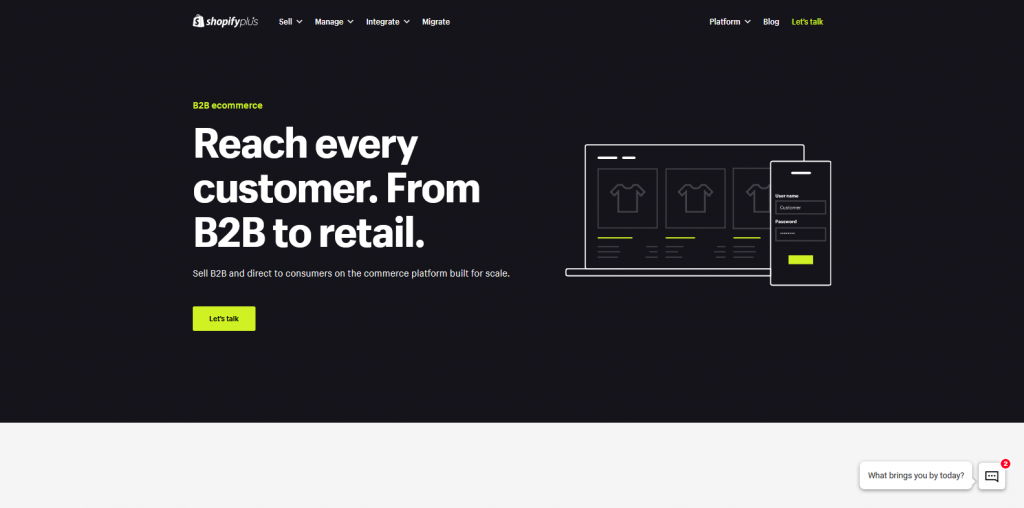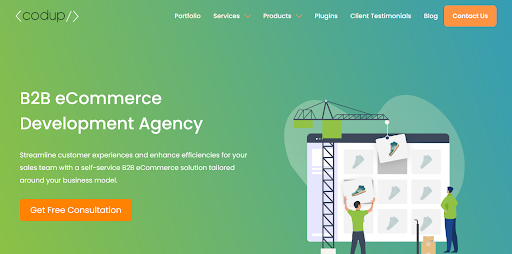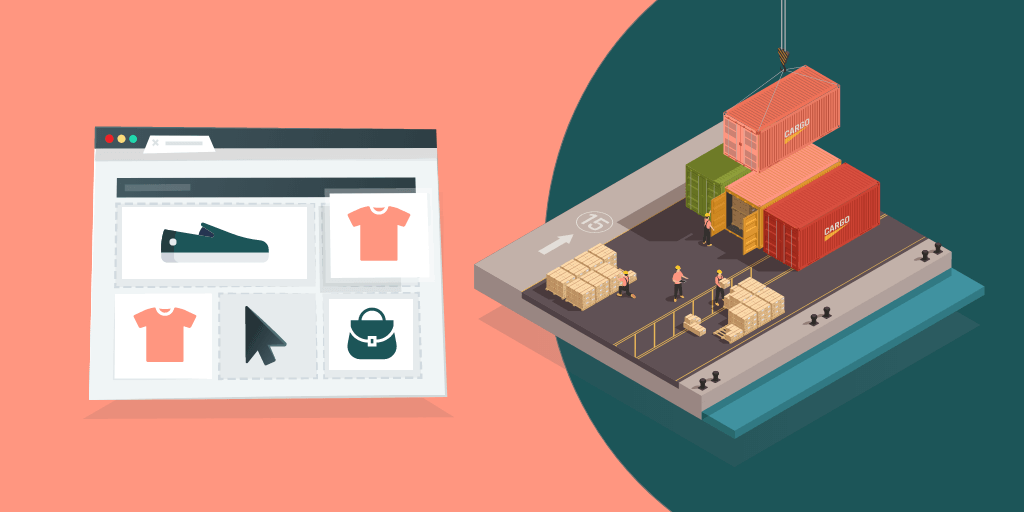With consumers moving towards online shopping, the time is now for B2B businesses to do the same.
B2B eCommerce has been prevalent for quite a few years. It has traction, but 2021 is the most opportune moment to start up a B2B eCommerce store. To learn how you can create a B2B eCommerce store in 2021, follow along with this article.
Reading through it, you will have a strong grasp of the factors required to start up a successful B2B store.
Defining Goals

Starting a business without a proper model? That’s a recipe for disaster through and through.
First off, you need to take note of your objectives. What kinds of your products or services will you be selling? Why are you setting up a B2B eCommerce store? Is it cost effective? Will you handle manufacturing and logistics? How will you market your B2B store?
From the business to the administrative, you need to consider everything. Having such foresight, ultimately helps you make more informed decisions.
Another important thing to point out: don’t follow the herd. Plenty of store owners create a digital presence because a competitor is doing the same. Each business is unique. What might work for someone else might not necessarily work for your business.
Your goals with your B2B eCommerce store should be akin to the following:
- Improving business revenues, and expanding the customer base.
- Improving customer experiences through a simplified online customer journey.
- Reduce labor or administrative costs associated by going digital.
- Automate sales and marketing processes.
- Avail the benefits of business process automation.
When you’re clear with your eCommerce goals, you can start planning your business. Figuring out your business model is very crucial. You need to consider everything from the business model, target audience, as well as the revenue model.
The first step towards creating an effective revenue and business model is competitor research. Research what other B2B companies are doing. For the target audience, you should create a buyer persona.
In the beginning, all these are hypothetical. Overtime, however, you will gain access to actual customer data. With it, you can alter your offerings to cater to customers at a granular level.
When the planning process is complete, you need to identify Key Performance Indicators (KPIs) for your business. These KPIs will be the major success points of your business.
A KPI can be anything from improving the average bulk order volume to increasing the number of products sold.
Focus on Customer Preferences

Customer satisfaction is the most important aspect of business.
Ecommerce giants like Amazon and Alibaba going above and beyond with customer satisfaction. Because of this, it’s hard for new entrants to keep up.
Because of these high-end customer services, customer expectations are also sky high. What can you, as a B2B store owner, do to ensure efficient customer service?
The answer is simple. Place yourself in their shoes. Understanding customer preferences helps you tailor your offerings to be more customer-savvy. From a B2B perspective, you can analyze the difficulties customers face during a purchase. It could be anything from poor logistics support, to even hurdles within the customer journey.
Now, customer preferences vary across the board, and you can’t offer convenience to each individual customer. What then?
An ideal solution to that problem is to ask customers what kind of service they want from your store. Even though there will be outliers from such a survey, you will still have a strong grasp of what customers want from your store.
Have a Dedicated Ecommerce Team

Why would I need an eCommerce team when I can take care of everything by myself?
That’s a common question, and one that does make sense to a certain degree. If you’re running a B2B start-up or small business, hiring a team can be costly. A counter-argument to this is that with an efficient team, you can specialize your business processes.
With an experienced eCommerce manager overlooking your operations, you can drive your business forward. With the professionalism also comes the alignment of your internal and external stakeholders.
Let’s see what an ideal eCommerce manager should bring to the table.
Ecommerce Leader
An eCommerce leader should have the following skills:
An understanding of what constitutes efficient sales and marketing alignment.
- Knowing what tools are the most efficient and how you can utilize them in the most effective manner.
- Social media marketing strategies.
- Leveraging eCommerce tools effectively.
A concerning point for most small businesses would be that hiring such a specialist can incur significant costs. Yes, it is a huge expense. The workaround to that, however, is to groom an existing employee who has had experience with eCommerce.
Ecommerce Project Team
Behind every successful eCommerce business, there is a strong eCommerce team that makes sure the business continues its growth.
If you do go about hiring an eCommerce team, make sure that they’re agile. They need to be insightful, creative, and able to quickly adapt to market trends.
In short, you need to have a team of experts.
Now, hiring a full-fledged eCommerce team isn’t everyone’s piece of cake. Start-ups and small-businesses need to make-do and make their team members wear multiple hats at work. Overtime, this will create a cohesive team that, while having other responsibilities, also manages the eCommerce side of the business.
It’s an efficient method of cutting costs and achieving results.
Selecting the right team members requires time and foresight. With quality team members, your B2B eCommerce store will be a lot more successful in the long run.
Ecommerce Requirements
Team building is a process that happens after a platform is selected. We mentioned team building first because having an expert team involved in the selection process can make it more efficient. Also, it can lead you to select the right B2B eCommerce platform.
When you have a team prepared, you can move on to platform selection.
Platform Selection
One of the most crucial processes in your B2B eCommerce journey, platform selection is vital. Why? Because once you choose a platform, you can’t go back.
There are plenty of considerations that you need to take into account before selecting an eCommerce store. You need to:
· Determine the administrative and business-related requirements of your business processes.
· Ascertain whether they are aligned with your goals.
· Analyze the costs and requirements of the platform.
Plugins and Integrations
These factors are an important identifier for an eCommerce store. You need to make sure whether your platform of choice has ERP, CMS, and CRM integrations that can support the processes.
There are also other technical requirements that you need to take into account as well.
Technical Requirements

You need to ask yourself the following questions:
· Is the platform flexible enough? Can it be customized according to my brand with the relevant 3rd party extensions. This can help you decide whether or not you want an open source or closed source SaaS solution.
· Which hosting provider should I select if I’m going for an open-source option?
· Will the platform integrate with my existing business systems like ERP, CRM, and CMS?
Now, let’s look at the various B2B eCommerce platforms present:
WooCommerce

A free eCommerce platform (minus the costs of hosting and domain), WooCommerce is an ideal open-source solution for anyone looking to customize their store at the granular level.
There are plenty of free plugins, themes, and extensions available on both WordPress and WooCommerce. They let you enhance the eCommerce experience significantly. If you already have an existing WooCommerce store, you can integrate an eCommerce functionality on the platform through B2BWoo – a complete WooCommerce B2B eCommerce solution.
Shopify:

Another go-to choice for individuals looking to start up an eCommerce store, Shopify is an ideal SaaS solution. It provides hundreds of plugins, themes, and extensions that allow you to improve the eCommerce experience.
To integrate a B2B functionality on your store, you have Shopify for B2B eCommerce that lets you add multiple B2B-facing functionalities to your store.
Magento
Another powerful, yet expensive platform, Magento is an ideal solution for business owners looking to create a highly robust eCommerce store. For B2B businesses, this is the correct fit. It has more variety in B2B features and functionality and can give your store the competitive edge.
It comes as both an open-source and closed-source version that you can use to cater to slower loading websites. The closed source enterprise version, however, is a lot faster.
Pre-planning
Before you start up your B2B eCommerce store, there are a lot of things that you need to take into account. From product descriptions, logo creation, wire-framing, and the overall structure of the website needs to be taken into account.
First and foremost, you need to define your product niche – what it is and what are the categories and subcategories of associated products you can display on your store. Create a list of all the available images, product tags, descriptions, and other factors so that they’re integrated properly into the website later on.
This is the product catalog of your website. It is a running log of all your offerings and their relevant pricing.
Contact an Ecommerce Development Agency

When you’ve set everything up internally, it’s time you move on to customizing your eCommerce store. Now, you can do that yourself or contact a B2B eCommerce development agency for in-depth customization.
An ideal eCommerce development agency should have the following attributes:
- A stellar development portfolio
- Quality customer reviews and testimonials
- Industry relevant case studies
- An in-depth understanding of B2B workflows
- Hands-on technologies
When you have a clear idea of what you want for your store, you can contact the developers. Translate your project and other essential requirements to the agency. In addition to that, you should also ask them relevant questions related to their workflow.
How they go about developing your B2B eCommerce store will help you understand their skill-set and whether they will meet your expectations. Lastly, focus on whether the website offers post-development support as well.
Launching and Marketing Your B2B Store
At this point, your B2B eCommerce store is ready to go live for the world to see. Here’s the thing though, how will the world see what you have to offer?
Marketing, simple.
Now, if you have a team at your behest, you can create a sub-branch of that team that focuses on marketing. They’ll deal with all things digital marketing, and get your store on the right track.
But if you want a run-down of the marketing strategies for your eCommerce business, then keep on reading.
Email Marketing
Email marketing, despite the criticisms is an effective way to market your B2B store as well as the offerings. To make sure your email marketing strategy is effective, you can utilize newsletters, product coupons, promotional advertisements, and personalized emails in your strategy.
On-site Optimization
Focusing on search engine optimization is another effective way of gaining more visitors to your website. You can write blogs, share videos, and use different types of content. In addition to that, focus on optimizing your website to reduce load times.
Social Media Marketing
Nowadays, marketing without the use of social media is ill advised. You can use a variety of social media tools to target a broader audience base and bring more traffic to your website. For B2B, there is no specific social media platform that you can use.
Ideally, however, you should start with Twitter, Instagram, Facebook, and LinkedIn.
Paid Marketing
Aside from social media, you can even utilize paid marketing to your advantage. Pay-Per-Click, sponsored search, and affiliate marketing are quick and efficient ways of gaining traction for your business.
If you’re starting out, we would recommend you begin with SEO and organic marketing and then, move on to paid marketing strategies for your business. Why? Because at its core, paid marketing is a bit costly and might give you desired results when you first begin with it.
In addition to these marketing strategies, don’t forget to optimize your website for multi-channel marketing.
Wrapping Up!
Ecommerce is evolving rapidly. Whether it be B2B or B2C, a digital presence helps you reach a broader audience base and improves your business prospects.
We hope that this article gave you a run-down of what you need to get started with your B2B eCommerce project in 2021.
Read Also
- How To Create a Bulk Order Form for B2B Online Stores on WooCommerce
- Using the Psychology of Urgency to Drive Ecommerce Conversions
- 8 Best Practice for Efficient Ecommerce Catalog Management
- Pros and Cons of Customized And Vendor-Based eCommerce Solutions
- 16 Essential Features for a B2B Ecommerce Store
- Build vs Buy? Exploring your B2B eCommerce options
- Improve the Ordering Process For Bulk Buyers with Product Tables
